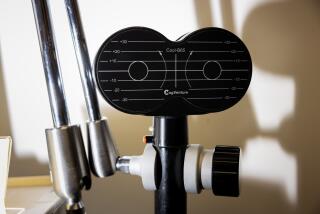Study finds antidepressant doesn’t help autistic children
- Share via
An antidepressant commonly prescribed to help autistic children control their repetitive behaviors is actually no better than a placebo, according to a report published today.
Roughly a third of all children diagnosed with autism in the U.S. now take citalopram, the antidepressant examined in the study, or others that are closely related. The results of the nationwide trial, published in Archives of General Psychiatry, have some experts reconsidering the appropriateness of antidepressants and other mind-altering drugs used to treat children with autism spectrum disorders.
“There are tons of things being advocated as treatments for autism, some with appropriate caveats and careful explanations, others without any of that,” said David Mandell, associate director of the Center for Autism Research at Children’s Hospital of Philadelphia, who wasn’t involved in the study.
An estimated 1.5 million Americans have autism, a group of poorly understood developmental disorders characterized by problems with communication and social interaction. One of the hallmarks of the disorder is obsessive, repetitive behavior such as flapping one’s arms or hands or memorizing car makes and models. When those routines are interrupted, severe tantrums can result.
Only one medication -- the antipsychotic drug risperidone -- has been approved by the Food and Drug Administration for the treatment of irritability and aggression in children with autism. But doctors, frustrated by their limited options, haven’t shied away from giving other pharmaceuticals a chance. Worldwide spending on drugs to treat autism is estimated to be $2.2 billion to $3.5 billion annually.
Because very few medications have been tested on autistic children in large, rigorous studies, doctors have looked to drugs that treat similar symptoms in other conditions, such as obsessive-compulsive disorder or attention-deficit hyperactivity disorder.
That’s what led physicians to a class of antidepressants called selective serotonin reuptake inhibitors, or SSRIs, that help adults with obsessive-compulsive disorder. Their repetitive rituals, such as counting, cleaning or hand-washing, are reminiscent of the behaviors seen in autistic patients.
Doctors were also hopeful about SSRIs because the serotonin system is known to function improperly in people with autism.
But the medications will work only if the root causes of obsessive-compulsive disorder and autistic repetitive behavior involve the same biological pathways in the brain. The new study strongly suggests they do not.
“It just begs for a more careful understanding of the neurological underpinnings of the disorder,” Mandell said.
Dr. Bryan King, director of psychiatry and behavioral medicine at Seattle Children’s Hospital and leader of the study, said he was shocked to find that citalopram didn’t help patients. Not only was the placebo slightly more effective, but the drug’s side effects -- such as impulsivity and insomnia -- were at least twice as bad, the study found.
“I personally would have a healthy dose of skepticism about” prescribing citalopram or other SSRIs, King said. Citalopram is sold in the United States under the brand name Celexa.
In the study, King and his colleagues from six academic medical centers, including UCLA, enrolled 149 autistic children ages 5 to 17 whose compulsive behaviors were classified as moderate or worse. After 12 weeks, 33% of the 73 patients who took citalopram had improvements in repetitive behaviors as measured by clinicians and parents, versus 34% of the 76 patients who took a placebo.
If there hadn’t been a control group for comparison, King said he would have been impressed by the improvement seen in the children who took the drug. “The decision would most definitely have been made to continue them,” he said.
The study underscores the value of evaluating drugs in randomized, double-blind, placebo-controlled studies, which are considered the gold standard of medical research, Dr. Fred R. Volkmar, director of the Yale Child Study Center in New Haven, Conn., wrote in a commentary that accompanied the study. In such studies, neither patient nor doctor knows who is getting the drug and who is getting the placebo until all the results are in.
“We need more studies of this kind to advance research and guide clinical practice,” Volkmar wrote.
Placebo-controlled studies are especially important in evaluating medications to treat behavior and mood because patients are typically in a crisis state when they enroll in a clinical trial and could improve on their own in time, Mandell said.
What’s more, the attention focused on children when they are in a trial tends to improve their behavior all by itself, Volkmar said in an interview.
The study was funded by the National Institutes of Health. King and several of his colleagues have received research grants and other funding from pharmaceutical firms, including Forest Laboratories Inc. of New York, the maker of Celexa.
--







